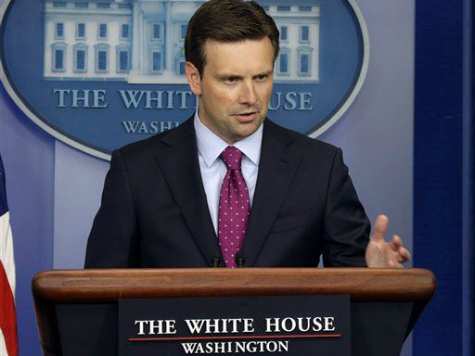
The United States withdrawal from Iraq in 2012 was celebrated as a major advancement in ending the war on terror, but as American presence diminishes in the nation, jihadist groups have made significant gains, taking over the second-largest city in the country.
The Obama administration has responded to the news that Mosul is now controlled by the jihadist group Islamic State of Iraq and the Levant (ISIL) by calling on the Iraq government to work harder to stop the spread of jihadist terrorism. Newly-minted White House Press Secretary Josh Earnest said Tuesday that the United States government is calling on Prime Minister Nouri al-Maliki “to do more to address unresolved issues to better meet the needs of all the Iraqi people… ultimately there is a responsibility on behalf of the Iraqi leaders to step up to the plate here.” Earnest added that the United States would “continue our important relationship in terms of providing some security assistance to the government of Iraq.”
Earnest’s comments were significantly more pointed regarding the Iraqi government’s current inability to stop the spread of ISIL (also know as ISIS, “Islamic State of Iraq and Syria”) than the official statement from the Department of State. “It should be clear that ISIL is not only a threat to the stability of Iraq, but a threat to the entire region,” said spokesperson Jen Psaki, promising the United States “will continue to work closely with Iraqi political and security leaders on a holistic approach to diminish ISIL’s capacity and ability to operate within Iraq’s borders.”
The call on the Iraqi government to exert more effort in fighting radical Islamists comes as Maliki announces an effort to arm the people of Iraq to protect themselves in towns where the military is no longer able to successfully function. Maliki said Tuesday the government of Iraq plans to provide weapons to civilians in areas affected by the ISIL onslaught, as well as having the Iraqi Parliament create “a special crisis cell to follow up on the process of volunteering and equipping and arming.”
Some who served in the United States government at the height of the Iraq War question whether ISIL’s current advances would have been possible with a stable, strong American military presence in the country. Former White House adviser on Iraq Douglas Ollivant told Australia’s ABC The World Today that the Iraqi army the United States left behind was woefully unprepared for a threat like ISIL, which has reinforced its number by transferring jihadists fighting in Syria over to Iraq. “The army that the United States left in Iraq, the Iraqi army, was able to handle the situation that we left it with at the time, was able to handle a low-grade, relatively unskilled local insurgency,” he explained. “What they’ve been unable to handle is essentially an invasion from Syria of an extremely well-trained, well-armed, well-equipped, highly motivated, blooded force that has been learning from Hezbollah the last two or three years how to fight this kind of fight.”
The assault on Iraq continues, with reports that ISIL has taken control of airports, government offices, churches, and television stations. It is believed that the jihadists will continue to spread and attempt to take over more territory within Iraq as the government scrambles to fight the threat.

COMMENTS
Please let us know if you're having issues with commenting.